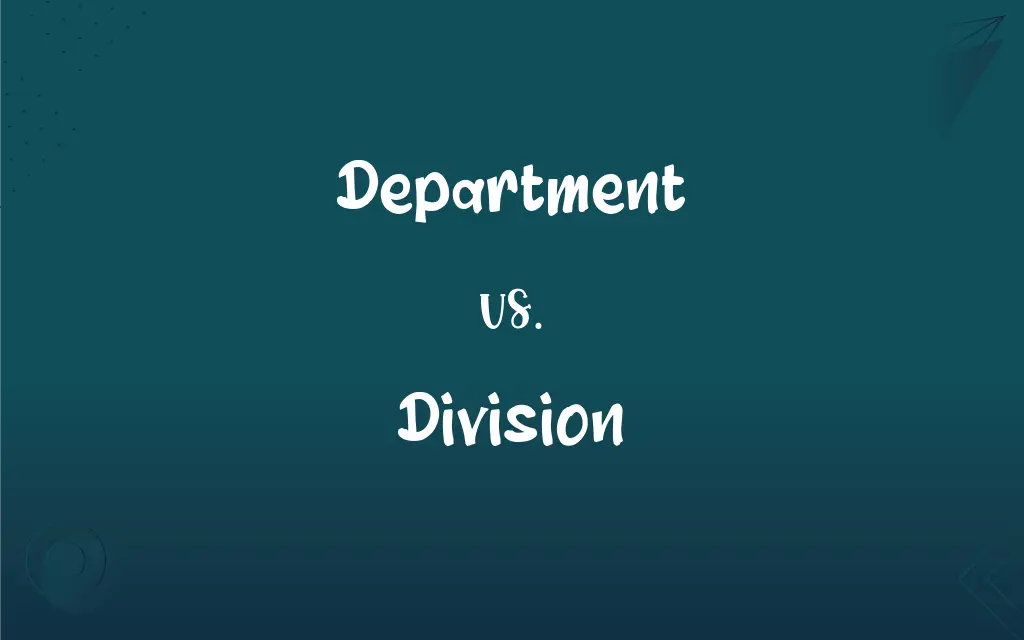Department vs. Division: What's the Difference?
Edited by Janet White || By Harlon Moss || Published on November 22, 2023
Department is a specialized functional area within an organization. Division is a large segment of a business that operates under the broader corporate umbrella.

Key Differences
A department refers to a specialized unit within an organization, focused on a specific area of work or expertise, such as Marketing or Human Resources. A division, on the other hand, is a larger part of a company that may encompass multiple departments, often operating semi-autonomously and focused on a broad business area or market.
Departments are usually smaller sections within a division or the entire organization, with a more narrow focus. While, divisions are typically higher up in the organizational hierarchy, overseeing various departments that pertain to their segment of the business.
Departments are managed by department heads, departments have specific, focused responsibilities and goals aligned with their area of expertise. Whereas, a division is managed by division heads or directors, with a broader scope of control and strategic focus that may impact multiple departments.
Departments are integral for the detailed, specialized functioning of the organization, dealing with specific tasks and processes. However, divisions often have a more strategic role, overseeing operations on a larger scale and making decisions that affect the company's direction in a specific market or area.
Department is generally smaller in scale, focusing on specific tasks or services within the organization. Conversely , division is usually larger, encompassing multiple departments, and may operate almost as a separate entity within the larger corporate structure.
ADVERTISEMENT
Comparison Chart
Scope
Specialized area within the organization.
Broad segment of the business.
Hierarchy
Lower, within a division or company.
Higher, overseeing multiple departments.
Management
Department heads, focused responsibilities.
Division heads, broader strategic control.
Function
Detailed, task-specific operations.
Strategic oversight and decision-making.
Size and Scale
Smaller, focused on specific tasks.
Larger, encompassing multiple departments.
ADVERTISEMENT
Department and Division Definitions
Department
A unit in an organization handling a specific function.
The finance department manages the company's budgets.
Division
In mathematics, the process of dividing one number by another.
The division of 10 by 2 results in 5.
Department
A division of a university or school offering courses in a specific field.
She's studying in the department of physics.
Division
A large and distinct unit of an organization with specific responsibilities.
The North American division handles all operations in that region.
Department
A distinct subject or field of inquiry.
That question is outside my department of expertise.
Division
A disagreement or difference causing a split within a group.
There was a division among the members on the new policy.
Department
A category of a larger business, such as retail.
The home appliances department is on the third floor.
Division
In sports, a group of teams competing at a similar level.
Our team won the division championship last year.
Department
A governmental section responsible for specific duties.
The Department of Health issued new guidelines.
Division
In military, a large unit of troops.
He was assigned to the 1st Armored Division.
Department
A division of a business specializing in a particular product or service
The personnel department.
Division
The act or process of dividing.
Division
The state of having been divided.
Division
(Mathematics) The operation of determining how many times one quantity is contained in another; the inverse of multiplication.
FAQs
Is a division bigger than a department?
Generally, yes. Divisions oversee broader areas than departments.
Do divisions have their own management?
Yes, divisions are typically managed by division heads or directors.
What is a department in a company?
A department is a specialized area within a company, like Sales or HR.
Can a department function independently?
Departments usually work interdependently but focus on specific tasks.
What role does a department play in an organization?
Departments handle specific, specialized functions within an organization.
Do divisions directly interact with customers?
It depends on the company's structure, but usually, departments handle day-to-day customer interactions.
Can a division contain multiple departments?
Yes, divisions often encompass several departments.
How are departments identified in a company?
Departments are usually named after their function, like "Marketing."
Do departments have their own budgets?
Typically, yes. Departments usually have budgets for their specific needs.
Are departments always part of a division?
Not always, especially in smaller organizations.
Are divisions common in all types of businesses?
Divisions are more common in larger, more complex organizations.
Can a division operate internationally?
Yes, divisions in multinational companies often operate in specific geographic regions.
Do divisions have a significant impact on company strategy?
Yes, divisions often play a key role in shaping company strategies.
Is it common for departments to collaborate?
Yes, inter-departmental collaboration is common and often necessary for organizational success.
Can a department have sub-departments?
Yes, larger departments may have sub-departments for finer specialization.
Can one be transferred from a department to a division?
Yes, depending on the organization's policies and the individual's role.
Are divisions ever outsourced or offshored?
Some companies may outsource or offshore entire divisions, depending on their business model.
Is a university department the same as a business department?
Conceptually similar, but university departments focus on academic disciplines.
Is the head of a division higher than a department head?
In most organizational structures, yes.
Can departments have their own culture?
Yes, departments can develop distinct cultures within the broader organizational culture.
About Author
Written by
Harlon MossHarlon is a seasoned quality moderator and accomplished content writer for Difference Wiki. An alumnus of the prestigious University of California, he earned his degree in Computer Science. Leveraging his academic background, Harlon brings a meticulous and informed perspective to his work, ensuring content accuracy and excellence.
Edited by
Janet WhiteJanet White has been an esteemed writer and blogger for Difference Wiki. Holding a Master's degree in Science and Medical Journalism from the prestigious Boston University, she has consistently demonstrated her expertise and passion for her field. When she's not immersed in her work, Janet relishes her time exercising, delving into a good book, and cherishing moments with friends and family.






































































